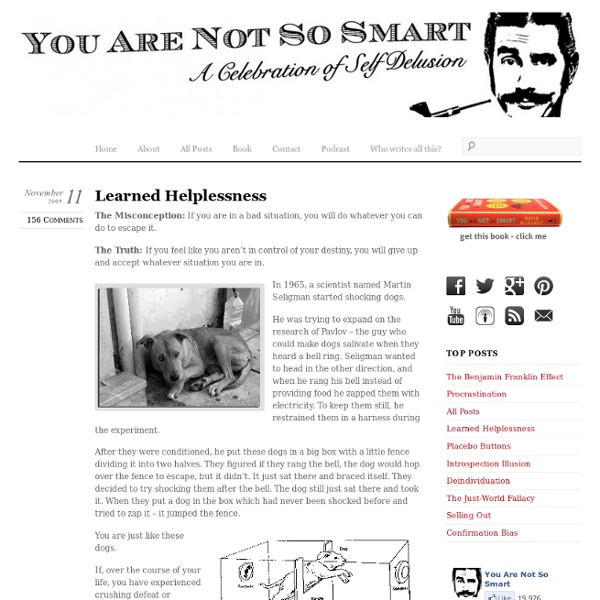10 Simple Postures That Boost Performance
Psychological research suggests simple actions can project power, persuade others, increase empathy, boost cognitive performance and more… We tend to think of body language as something that expresses our internal states to the outside world. But it also works the other way around: the position of our body also influences our mind. As the following psychological research shows, how we move can drive both thoughts and feelings and this can boost performance. 1.
Beautiful Perth: 2% or 98% of Population?
Just follow these instructions, and answer the questions one at a time and as quickly as you can! Again, as quickly as you can but don't advance until you've done each of them .... really. Now, scroll down (but not too fast, you might miss something).
The Top 10 Psychology Studies of 2010
The end of 2010 fast approaches, and I'm thrilled to have been asked by the editors of Psychology Today to write about the Top 10 psychology studies of the year. I've focused on studies that I personally feel stand out, not only as examples of great science, but even more importantly, as examples of how the science of psychology can improve our lives. Each study has a clear "take home" message, offering the reader an insight or a simple strategy they can use to reach their goals , strengthen their relationships, make better decisions, or become happier. If you extract the wisdom from these ten studies and apply them in your own life, 2011 just might be a very good year. 1) How to Break Bad Habits If you are trying to stop smoking , swearing, or chewing your nails, you have probably tried the strategy of distracting yourself - taking your mind off whatever it is you are trying not to do - to break the habit.
Neuroscience clues to who you aren't
Michael Bond, consultant THE problem of the self - what it is that makes you you - has exercised philosophers and theologians for millennia. Today it is also a hotly contested scientific question, and the science is confirming what the Buddha, Scottish philosopher David Hume and many other thinkers maintained: that there is no concrete identity at the core of our being, and that our sense of self is an illusion spun from narratives we construct about our lives. Bruce Hood's The Self Illusion is a thoroughly researched and skillfully organised account of the developments in psychology and neuroscience that are helping to substantiate this unsettling vision of selfhood.
Top 10 Common Faults In Human Thought
Humans The human mind is a wonderful thing. Cognition, the act or process of thinking, enables us to process vast amounts of information quickly. For example, every time your eyes are open, you brain is constantly being bombarded with stimuli. You may be consciously thinking about one specific thing, but you brain is processing thousands of subconscious ideas. Unfortunately, our cognition is not perfect, and there are certain judgment errors that we are prone to making, known in the field of psychology as cognitive biases.
Color Psychology
by David Johnson Like death and taxes, there is no escaping color. It is ubiquitous. Yet what does it all mean? Why are people more relaxed in green rooms?
Fun Facts
Fun Facts that you always wanted to know ........!!! If you yelled for 8 years, 7 months and 6 days, you would have produced enough sound energy to heat one cup of coffee. The strongest muscle in proportion to its size in the human body is the tongue. Every time you lick a stamp, you're consuming 1/10 of a calorie.
The Ten Most Revealing Psych Experiments
Psychology is the study of the human mind and mental processes in relation to human behaviors - human nature. Due to its subject matter, psychology is not considered a 'hard' science, even though psychologists do experiment and publish their findings in respected journals. Some of the experiments psychologists have conducted over the years reveal things about the way we humans think and behave that we might not want to embrace, but which can at least help keep us humble. That's something. 1. 'Lord of the Flies': Social Identity Theory
The Upside of Anger: 6 Psychological Benefits of Getting Mad
We tend to think of anger as a wild, negative emotion, but research finds that anger also has its positive side. There are all sorts of good sensible, civilised reasons to avoid getting angry. Not only does it make you feel bad, it makes you do stupid things without noticing the risks and it can be self-destructive.
Top 10 Thinking Traps Exposed
Our minds set up many traps for us. Unless we’re aware of them, these traps can seriously hinder our ability to think rationally, leading us to bad reasoning and making stupid decisions. Features of our minds that are meant to help us may, eventually, get us into trouble. Here are the first 5 of the most harmful of these traps and how to avoid each one of them. 1.



